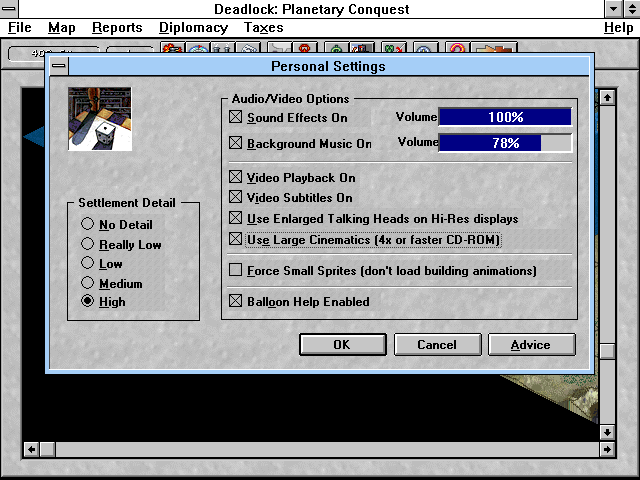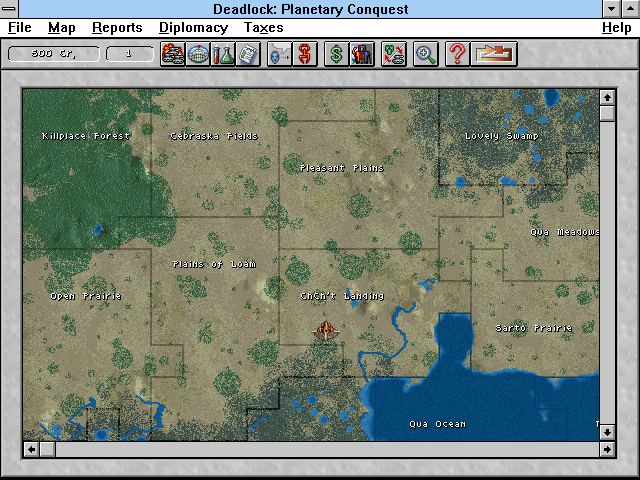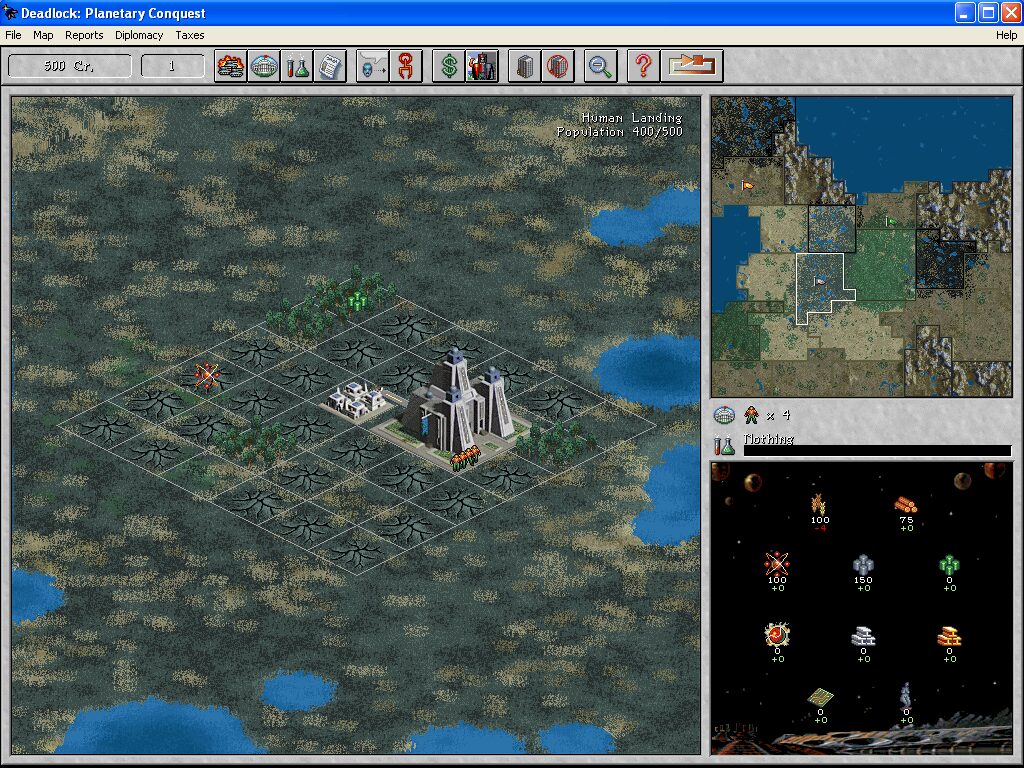Retro Replay Review
Gameplay
Deadlock: Planetary Conquest delivers a deeply engaging 2D turn-based 4X experience where each decision carries weight. From your very first turn, you’ll be weighing the benefits of rapid expansion against the risk of spreading your resources too thin. The game’s seven unique races—each with special abilities such as the Maugs’ scientific prowess or the ChCh-T’s impressive birth rate—ensure that no two playthroughs ever feel the same.
(HEY YOU!! We hope you enjoy! We try not to run ads. So basically, this is a very expensive hobby running this site. Please consider joining us for updates, forums, and more. Network w/ us to make some cash or friends while retro gaming, and you can win some free retro games for posting. Okay, carry on 👍)
Expanding your empire requires careful city management. Every area on the planet’s surface can host a city, but to claim a new territory you must construct colonizers and dispatch them across uncharted fields. Once established, city planners face a strategic juggling act: erect residential buildings to house a growing population, build farms and factories to sustain them, and establish mines and research centers to push your technological edge.
Research is the backbone of victory, and Deadlock’s tech tree thrives on variety. Early inventions like the hydroponic farm can dramatically boost food production, while advanced materials open doors to powerful new units and fortifications. Balancing your research priorities against immediate military needs often proves the tipping point between glorious domination or ignominious defeat.
Graphics
While Deadlock’s visuals are decidedly “retro” compared to modern 3D epics, its crisp 2D sprite work brings the alien world to life in a charming, stylized manner. Cities, units, and terrain types are clearly distinguishable at a glance, making strategic planning a breeze even on complex maps. The vibrant color palette adds character to each race’s structures and units, reinforcing their unique identities.
Battle animations deserve special mention: when armies clash, brief cutscene-style sequences unfold on a separate battlefield. Although you cannot control units during these engagements, the dynamic animations—laser blasts, missile trails, and explosions—make each skirmish feel impactful. It’s a visual reward that heightens the tension between turns.
User interface elements are clean and intuitive, albeit dated by modern standards. Information on city production queues, technology progress, and diplomatic relations is accessible via well-organized menus. Occasional pixelation at very high resolutions can occur, but it seldom hinders the strategic flow. Overall, Deadlock’s graphics strike a nostalgic chord while remaining functional and engaging.
Story
Deadlock’s narrative framework is deceptively simple: seven alien races, marooned on an inhospitable planet, vie for survival and supremacy. Yet within this premise lies a wealth of emergent storytelling. Diplomatic alliances form and crumble, unexpected technological breakthroughs shift the balance of power, and espionage missions can sow distrust that alters the course of a campaign.
Individual race backstories are woven into their special abilities, giving players a sense of cultural flavor even in the absence of lengthy cutscenes or voice acting. For instance, the Maugs’ relentless pursuit of knowledge is reflected in accelerated research speeds, while the ChCh-T’s prolific breeding rate can quickly flood frontier worlds with settlers. These mechanics reinforce the narrative identity of each faction.
Cutting through the planet’s surface conflict is a subtle commentary on the perils of unchecked expansion and the importance of citizen welfare. If your population becomes dissatisfied—whether through overtaxation or underinvestment in amenities—protesters can halt production and erode your empire from within. Managing citizen morale adds a human element to the grand strategy, making every choice feel consequential.
Overall Experience
Deadlock: Planetary Conquest stands as a testament to classic 4X strategy design. Its blend of city building, research progression, and tactical battles ensures that every turn remains meaningful. The learning curve is moderate; new players may be overwhelmed by interconnected systems at first, but the satisfaction of mastering this intricate web of mechanics is immense.
Replaying the game with different races unlocks new strategic possibilities and keeps the experience fresh. Whether you’re forging a research-driven Maug empire or unleashing ChCh-T population surges, each run feels distinct. The addition of espionage and diplomacy further deepens your engagement, creating unpredictable moments that spark genuine excitement.
In a market saturated with high-budget 4X titles, Deadlock’s modest visuals and retro interface might deter some, but its core gameplay remains timeless. For fans of tactical depth, empire building, and emergent storytelling, Planetary Conquest offers countless hours of thoughtful strategy. It’s an essential pick for anyone seeking a classic turn-based challenge with plenty of replay value.
 Retro Replay Retro Replay gaming reviews, news, emulation, geek stuff and more!
Retro Replay Retro Replay gaming reviews, news, emulation, geek stuff and more!









Reviews
There are no reviews yet.